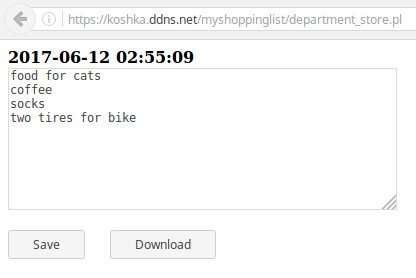
In my family we often used pieces of paper to write down a list for the next grocery store visit.
In most cases those papers were used to pass a list of necessary purchases from my wife to me, but also they could be used by one person to write down all necessities before shopping.
I think this is a common situation and many people use such lists.
Actually, we used small square stickers and stuck them on the fridge.
After some time I began to feel some inconvenience because sometimes I forgot to take these lists to the grocery or I couldn’t understand a handwriting.
So I decided to do a simple web service on my own web server, that will serve as a shopping list.

I believe, there are already some similar services. I believe they have nice web interfaces and dedicated android/ios apps. Probably some of them are free at least in the basic configuration. But I am not interested in them 🙂
I wanted my own, secure, private, reliable service with minimal IP traffic requirements.
By the way, have you ever seen a SOAP request carrying, for example, an array of 10 digits? I have seen such 500KB monster in SOAP::Lite/OTRS and that is why I am afraid of any apps with unknown protocols. I pay for each MB in my cell phone plan and want to reduce traffic consumption.
I have created a simple CGI Perl script. I tried to use in this script as less external modules as possible, although it might not be considered as a good idea by some people. Also I used MySQL backend for this project, because it is very convenient to me – to use a database, although for the simplicity I had to use a text file backend.
This script is used for very simple web page, containing only one <textarea> field and two <button>s. This page has no its own html or template file and described inside of the script.
shoppinglist.cgi
1 2 3 4 5 6 7 8 9 10 11 12 13 14 15 16 17 18 19 20 21 22 23 24 25 26 27 28 29 30 31 32 33 34 35 36 37 38 39 40 41 42 43 44 45 46 47 48 49 50 51 52 53 54 55 56 57 58 59 60 61 62 63 64 65 66 67 68 69 70 71 72 73 74 75 76 77 78 79 80 81 82 83 84 85 86 87 88 89 90 91 92 93 94 95 96 97 98 99 100 101 102 103 104 105 106 107 108 109 110 111 112 113 114 115 116 117 118 119 120 121 122 123 124 125 126 127 128 129 130 131 132 133 134 135 136 137 138 139 | #! /usr/bin/perl use strict; use utf8; use DBI; # actually I do not use this feature in the script # but MySQL prior to version 5.6 did not allow ON UPDATE CURRENT_TIMESTAMP for a DATETIME field # so I had to form and update date by myself my $curtime = do { my ($s,$m,$h,$D,$M,$Y)=localtime; $Y+=1900; $M++; "$Y-$M-$D $h:$m:$s" }; # 'dispatcher' # which shopping list do we use my $target = $ENV{REQUEST_URI}; # each list has it's own, filename for download etc # all lists are stored in the same table but has a different key string to distinguish them my ($dbkey, $cgifilename, $dwfilname, $title) = do{ if( $ENV{REQUEST_URI} =~ m[/my_list_one.pl(\?|$)] ){ ('list1', 'list1.pl', 'list1_shopping.txt', 'Grocery list') }elsif( $ENV{REQUEST_URI} =~ m[/auchan.pl(\?|$)] ){ ('list2', 'list2.pl', 'list2_shopping.txt', 'Auchan list') } else{ die "undetermined source of the request, exiting \n"; } }; # analyse cgi params by ourselves # do not want to use CGI module for a few strings my $request_string = ''; my %CGI_PARAMS = (); read(STDIN, $request_string, $ENV{CONTENT_LENGTH}) if $ENV{REQUEST_METHOD} eq 'POST'; $request_string = $ENV{QUERY_STRING} if $ENV{REQUEST_METHOD} eq 'GET'; my @cgi_pairs = split(/&/, $request_string); foreach my $pair (@cgi_pairs) { my ($name, $value) = split(/=/, $pair); $value =~ tr/+/ /; $value =~ s/%([a-fA-F0-9][a-fA-F0-9])/pack("C", hex($1))/eg; $CGI_PARAMS{$name} = $value; } # perform tag replacements by ourselves # do not want to use HTML::Entities for a simple replacement my %replacements = ( '"' => '"', '\'' => ''', '>' => '>', '<' => '<', ); my $dbh = DBI->connect( 'DBI:mysql:shopping:localhost', 'username', 'password', { RaiseError => 0, AutoCommit => 1, mysql_enable_utf8 => 1 }) or die "Unable to connect to db\n"; $dbh->do("SET NAMES UTF8"); # texarea have come back so we have to write her data and display the result if( $CGI_PARAMS{'wrlist'} ){ my $new_list = $CGI_PARAMS{'wrlist'}; decode_entities( $new_list ); my $statement = "INSERT INTO shoppinglist (rec_date, rec_list, rec_target) VALUES (?,?,?)"; $dbh->do($statement, undef, $curtime, $new_list, $dbkey); my ($date, $list) = $dbh->selectrow_array("SELECT rec_date, rec_list FROM shoppinglist WHERE rec_target = '$dbkey' ORDER BY rec_id DESC LIMIT 1"); print "Status: 301 Moved Permanently\nLocation: https://koshka.ddns.net/myshoppinglist/$cgifilename\n\n"; # PRG pattern } elsif( $CGI_PARAMS{'downloadlist'} ){ # textarea's content should be downloaded as file my ($date, $list) = $dbh->selectrow_array("SELECT rec_date, rec_list FROM shoppinglist WHERE rec_target = '$dbkey' ORDER BY rec_id DESC LIMIT 1"); my $data = $date . "\r\n" . $list; use bytes; my $datalength = length($data); no bytes; print "Content-Type: application/text-html\nContent-Disposition: attachment; filename=$dwfilname\nContent-Transfer-Encoding: binary\nContent-Length: $datalength\n\n"; print $data; } else{ # no CGI parameters - returning current shoppinglist appropriate to the request uri my ($date, $list) = $dbh->selectrow_array("SELECT rec_date, rec_list FROM shoppinglist WHERE rec_target = '$dbkey' ORDER BY rec_id DESC LIMIT 1"); send_page($date, $list); } sub send_page{ my ($date, $curr_list) = @_; my $header = "Content-type: text/html\n\n"; encode_entities($curr_list); my $body = '<!DOCTYPE html> <html> <head> <meta charset="utf-8"> <title>'.$title.'</title> </head> <body> <script language="javascript"> function updatelist() {document.getElementById("myShopForm").submit();} function downloadlist() {document.getElementById("reqdownload").submit();} </script> <span style="font-weight:bold">' .$date . '</span><br> <form method="POST" id="myShopForm" name="myShopForm"> <textarea cols=50 rows=30 name="wrlist">' . $curr_list . '</textarea> </form> <br> <button id="savebtn" onClick="updatelist()">Save</button> <button id="downloadbtn" onClick="downloadlist()" style="margin-left:20px;">Download</button> <form id="reqdownload" method="GET" > <input type=hidden name=downloadlist value=1 id=downloadlist> </form> </body> </html>'; # we should use GET request for download because some mobile browsrs do not understand form POSTing for download (CM13 default browser) binmode STDOUT, ':utf8'; print $header, $body; } sub encode_entities{ $_[0] =~ s/$_/$replacements{$_}/gm foreach keys %replacements; } sub decode_entities{ $_[0] =~ s/$replacements{$_}/$_/gm foreach keys %replacements; } |
This project implies that you can create a number of shopping lists.
Each shopping-list, of course, must has its own http file name and by this name it will be distinguished by the script.
For example, if you want to create two independent lists:
1) create the main list which name will be the name of the real backend script on your server
/var/www/myshopping/main_shoppinglist.pl
this file might be accessible from the outside world as http://your.server.com/myshopping/main_shoppinglist.pl
Of course, ‘dispatcher'(lines 21-30) must know the name ‘main_shoppinglist.pl’ and which database key it corresponds to.
2) to add one more list simply create a symlink near the main script, pointing to the main script.
ln -s ./new_shoplist.pl /main_shoppinglist.pl |
Now, when you access new_shoplist in a browser – you actually call main_shoppinglist.pl but pass to it ‘new_shoplist.pl’ as a REQUEST_URI, so you should add proper credentials for this new list in the ‘dispatcher’.
Database for this project is simple, consist of one table and store all shopping history :). The rec_target column is used to distinguish different lists.
CREATE TABLE `shoppinglist` ( `rec_id` INT(10) UNSIGNED NOT NULL, `rec_date` datetime NOT NULL, `rec_target` VARCHAR(16) NOT NULL, `rec_list` text ) ENGINE=InnoDB DEFAULT CHARSET=utf8; ALTER TABLE `shoppinglist` ADD PRIMARY KEY (`rec_id`), ADD KEY `rec_target` (`rec_target`); ALTER TABLE `shoppinglist` MODIFY `rec_id` INT(10) UNSIGNED NOT NULL AUTO_INCREMENT, AUTO_INCREMENT=1; |
Any kind of sessions or locks at application level are not supported in this script. It is redundant complexity in my opinion.
I actually use this service for a few weeks and found it convenient. It works well on desktop Forefox/Chrome and even in Android 4.4.2 standard browser. It also worked in a few different Opera browsers for Android and Lineageos’ Jelly browser.